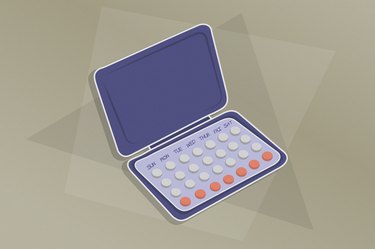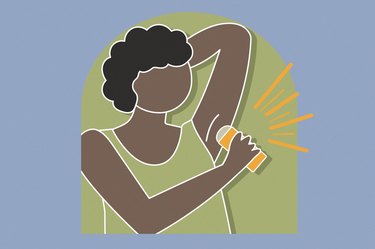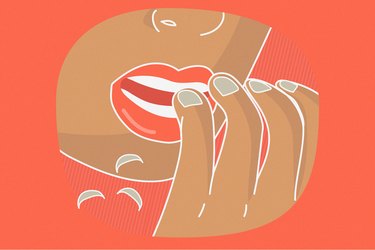
When the birth control pill was invented in 1960, it was a runaway success. No surprise here, given that it is amazingly effective at preventing pregnancy when used as prescribed. What's more, it allowed people assigned female at birth (AFAB) to take their reproductive health into their own hands for the first time — a monumental accomplishment.
Its popularity continues today, with about a quarter of people AFAB ages 15 to 49 using hormonal birth control, according to an October 2020 report from the Centers for Disease Control and Prevention (CDC).
Video of the Day
Video of the Day
Still, in spite of everything it has going for it, some young people have reservations, in part due to concerns about synthetic hormones in contraception. In a March 2018 Cosmopolitan and Power to Decide survey, 26 percent of people AFAB said they were switching to a non-hormonal method.
But is hormonal birth control bad for you? If you've had second thoughts about hormonal birth control, we're going to put your mind at ease. Here, we dig into the science to uncover both the risks and benefits. The upshot: The vast majority of women can safely use the Pill, patch, ring — or whichever contraception method they choose.
How Does Hormonal Birth Control Work?
Typically, this type of contraceptive relies on synthetic versions of two naturally occurring hormones: progesterone and estrogen.
Synthetic progesterone (called progestin) is primarily responsible for preventing pregnancy. "It suppresses ovulation and thickens the cervical mucus so sperm is not penetrable," Aparna Sridhar, MD, associate clinical professor of obstetrics and gynecology at UCLA Health, tells LIVESTRONG.com.
Synthetic estrogen also helps stop ovulation, which is the release of an egg from your ovaries into your fallopian tube, where it can then be fertilized. "But its main benefit is cycle control," Dr. Sridhar says. Basically, estrogen prevents breakthrough bleeding so you have a "normal" period that mimics a natural menstrual cycle.
Some forms of hormonal birth control (like the Pill, the patch and the ring) contain both progesterone and estrogen. These are called combined hormonal contraception. Others only contain progesterone. These non-estrogen methods include the mini Pill, hormonal IUD, implant and injection.
Can It Increase Your Cancer Risk?
According to the National Cancer Institute, the most recent research suggests that combined hormonal birth control might stimulate the development and growth of certain types of cancer, modestly raising your risk of breast cancer by about 20 percent. The American College of Obstetricians and Gynecologists points out that this is equivalent to one additional instance of invasive breast cancer for every 7,690 people using hormonal contraception.
In addition, people AFAB who have used oral contraceptives for five or more years have a greater risk of cervical cancer. Birth control can make your cervical cells more vulnerable to infection, and as a result you are more likely to contract HPV, a sexually transmitted infection that may cause cervical cancer. But you can help prevent HPV — and cervical cancer — if you get the HPV vaccine or use condoms.
Related Reading
What About Mood Changes?
The jury is still out on whether hormonal birth control affects your mood.
A November 2016 study in JAMA Psychiatry suggests that hormonal birth control users are more likely to be diagnosed or treated for depression. And a May 2017 study in Fertility and Sterility suggests that using hormonal birth control significantly reduces general wellbeing.
Yet earlier research, including a November 2013 study in the American Journal of Epidemiology, found that hormonal contraception decreased depressive symptoms among young people AFAB.
"The data has been conflicting," Dr. Sridhar says. "There are a lot of factors that could influence your mood." As a result, it can be difficult to identify the root cause of emotional distress.
For example, if your mood changes appear just before your menstrual cycle, you could be experiencing PMS — or even PMDD if your symptoms are very severe. "For these people, the birth control pill might actually be beneficial," Dr. Sridhar says.
And of course, don't forget that unintended pregnancy itself can trigger adverse mental health outcomes like depression and anxiety.
However, if you notice an acute shift in your emotional state shortly after starting a hormonal birth control method, it's worth having a conversation with your provider to explore whether a component of the contraception might be affecting you. "In that case, you may want to look into decreasing your dose or switching to something else to see if that makes it better," Dr. Sridhar says.
Related Reading
Can It Lower Your Libido?
You may have heard that hormonal birth control sabotages your sex drive — but desire is multifaceted, making this a challenging area of study.
A March 2019 article in the International Journal of Reproductive Medicine stated that, "Several studies have linked hormonal contraception to negative effects of sexual function, but also to a neutral effect, or an improvement in sexual domains."
"Arousal is not a linear process," Dr. Sridhar says. "A drop in libido could be due to a change in the amount of vaginal lubrication caused by hormone exposure [in birth control], but sometimes it is due to intrinsic factors that are completely unrelated to contraception."
Ultimately, it's still up in the air. "But studies have not found a clear association proving a cause and effect," Dr. Sridhar says. If you've noticed a change in your sexual function and suspect it might be a result of contraception, talk to your health care provider about lowering the dose of hormones or trying a different method.
4 Benefits of Hormonal Contraception
While the primary perk is, of course, putting the kibosh on pregnancy, there are other potential upsides to hormonal birth control.
1. Reduced Risk of Certain Cancers
According to the National Cancer Institute, people AFAB who have used oral contraception have at least a 30 percent reduced risk of developing endometrial cancer, a 30 to 50 percent lower risk of ovarian cancer and a 15 to 20 percent lessened risk of colorectal cancer.
2. Fewer Symptoms of PMS, PMDD and Perimenopause
Per the U.S. Department of Health and Human Services (HHS), scientists don't know for sure what causes PMS — or its more serious counterpart, premenstrual dysphoric disorder (PMDD). But hormonal changes during your cycle may play a role.
Hormonal contraception might lessen some of these bothersome symptoms by preventing ovulation, according to ACOG. "These hormones can decrease heavy menstrual bleeding and help with painful menstrual cramps," Dr. Sridhar says.
If you're going through perimenopause (the transition to menopause), low-dose birth control pills might make you more comfortable. According to Harvard Health Publishing, they can help regulate and lessen bleeding, curb hot flashes, even out your mood, relieve vaginal dryness and curtail bone loss.
3. Lower Risk of Anemia
Because hormonal birth control decreases menstrual bleeding, it can reduce the risk of iron-deficiency anemia, the HHS reports.
4. Clearer Skin
A May 2014 meta-analysis in the Journal of the American Academy of Dermatology found that after taking combined oral contraceptives for six months, acne was reduced by 49 percent.
6 Times You May Not Want to Take Combined Hormonal Contraception
First, know this: Combined hormonal birth control is totally safe for most people assigned female at birth. "Every medical intervention and medication comes with risks and side effects — nothing is 100 percent perfect," Dr. Sridhar says. "But the available birth control methods have been extensively studied and are on the market for a reason: to prevent pregnancy and provide non-contraceptive benefits."
That said, some people are more likely to have negative outcomes. Before prescribing birth control, your health care provider will screen you to determine your risk level and figure out which method is right for you. Typically, they'll refer to the U.S. Medical Eligibility Criteria for Contraceptive Use, a guide that details whether or not certain types of birth control methods are recommended based on your personal or family health history.
Here are some instances in which you might want to stick with estrogen-free contraception:
1. You Smoke
"If you smoke more than 15 cigarettes a day or are over the age of 35, taking estrogen can increase your risk of cardiovascular disease," Dr. Sridhar says.
2. You Have a Personal or Family History of Certain Types of Breast Cancer
According to BreastCancer.org, birth control that contains hormones might increase your risk of developing cancer or of a previous cancer recurring, depending on the type of breast cancer.
3. You Have a Personal or Family History of Blood Clots
This includes DVT and pulmonary embolism.
"Estrogen increases the likelihood of clotting," says Jessica Shepherd, MD, assistant clinical professor of obstetrics and gynecology and director of minimally invasive gynecology at the University of Illinois College of Medicine. So if your risk level is already elevated, it might be better to choose a different method.
4. You Have a Personal or Family History of Cardiovascular Disease
Think: heart disease, ischemic stroke, high blood pressure.
"A stroke happens when you develop a clot in an artery that decreases blood flow to the brain," Dr. Shepherd says. Because estrogen can heighten clotting risks, you may want to steer clear.
"Hypertension also increases your chances of clotting — and estrogen can create some increases your blood pressure," Dr. Shepherd says. Dr. Sridhar points out that only people AFAB with high blood pressure severe enough to require medication are at risk.
5. You Have Migraines With Aura
If your headaches are accompanied by tingling or numbness on one side of your body, trouble speaking or unusual vision changes, you may have a migraine with aura.
"For these people, taking birth control that contains estrogen can significantly increase your risk of blood clots and strokes," Dr. Sridhar says.
It's OK to use estrogen-containing birth control if you have other types of headaches — including cluster headaches, tension headaches and migraines without aura.
6. You Recently Gave Birth
According to the ACOG, people AFAB should avoid combined hormonal birth control in the three weeks following delivery, when your risk of blood clots is higher.
Also, you may want to avoid estrogen while breastfeeding. Talk to your ob-gyn about which birth control method is best when you're nursing.
The One Time You May Want to Avoid Progestin-Only Contraception
Most health concerns about hormonal birth control are related to estrogen. "There are very few contraindications for progestin," Dr. Sridhar says. "The main one is a personal history of current or recent breast cancer."
So, How Bad Is It Really to Use Hormonal Birth Control?
Every medication comes with some degree of risk. "But you can see, based on the studies, that for most people the risks are actually very minimal," Dr. Shepherd says. Meanwhile, the payoff of preventing pregnancy and having control over your fertility and sexual health — plus a slew of other tangential perks — is significant.
"It is so important to have a robust conversation with your health care provider about which birth control options are right for you," Dr. Shepherd says. "That way, you can discuss your personal and family history, lifestyle and preferences, such as whether you'd like a short-acting or long-acting method."
Ultimately, the hormones in and of themselves aren't harmful for most people. "I believe that any medication — be it birth control or anything else — is good if it is providing a benefit to the individual and is chosen correctly and safely between them and their health care provider," Dr. Sridhar says.
- CDC: "Current Contraceptive Status Among Women Aged 15–49: United States, 2017–2019"
- Cosmopolitan: "Are Young Women Totally Over the Pill?"
- American College of Obstetricians and Gynecologists: "Combined Hormonal Birth Control: Pill, Patch, and Ring"
- CDC: "US Medical Eligibility Criteria (US MEC) for Contraceptive Use, 2016"
- HSS: "Premenstrual syndrome (PMS)"
- ACOG: "Premenstual Syndrome (PMS)"
- Journal of the American Academy of Dermatology: "Meta-analysis comparing efficacy of antibiotics versus oral contraceptives in acne vulgaris"
- Harvard Health Publishing: "Perimenopause: Rocky road to menopause"
- JAMA Psychiatry: "Association of Hormonal Contraception With Depression"
- American Journal of Epidemiology: "Association of hormonal contraceptive use with reduced levels of depressive symptoms: a national study of sexually active women in the United States"
- International Journal of Reproductive Medicine: "The Potential of Hormonal Contraception to Influence Female Sexuality"
- HSS: "Iron-deficiency anemia"
- National Cancer Institute: "Oral Contraceptives and Cancer Risk"
- Breastcancer.org: "Is There a Link Between Birth Control Pills and Higher Breast Cancer Risk?"
- ACOG: "Hormonal Contraception and Risk of Breast Cancer"
- Fertility and Sterility: "A first-choice combined oral contraceptive influences general well-being in healthy women: a double-blind, randomized, placebo-controlled trial"
Is this an emergency? If you are experiencing serious medical symptoms, please see the National Library of Medicine’s list of signs you need emergency medical attention or call 911.



